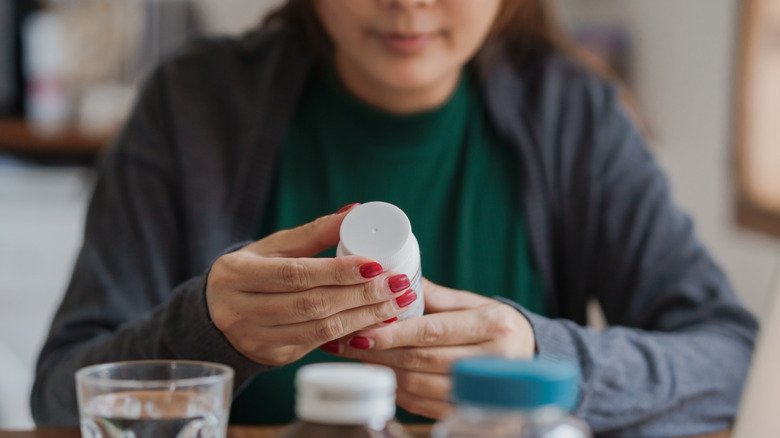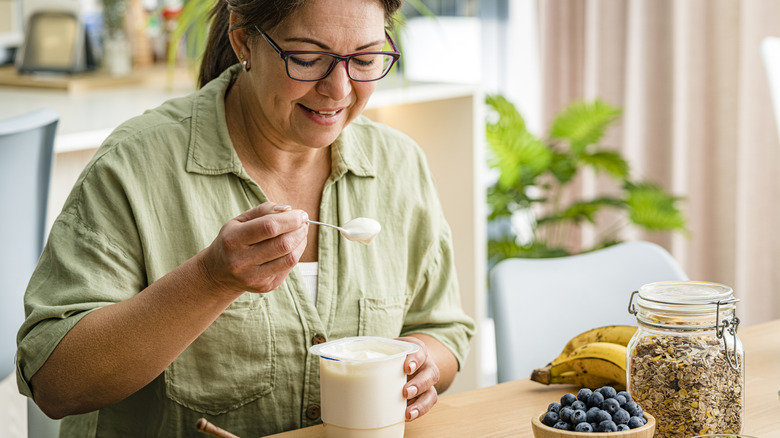
Nomadnes/Getty Images
If your doctor says your cholesterol needs to come down, you may need to make some lifestyle changes, like exercising more, losing a bit of weight, and reducing your intake of saturated fats. But for some people, these changes alone aren’t enough. In those cases, statins such as Lipitor can be highly effective at reducing cholesterol levels and lowering the risk of heart attack and stroke.
Like most drugs, Lipitor (generic name atorvastatin) comes with some side effects, depending on your age, health status, and other medications. Some people may feel muscle pain, while others may experience urinary tract infections. Another possible side effect of Lipitor is diarrhea, and Dr. Jason Singh, Chief Medical Officer of One Oak Medical Group, tells Health Digest that all statins may affect your digestive system in the same way.
“How it does so is believed to be related to how it alters bile acid metabolism,” Singh said. “By increasing synthesis of bile acids (as a mechanism for it to lower cholesterol) in the colon, this can stimulate fluid secretion and accelerate intestinal transit, leading to diarrhea.”
How to alleviate diarrhea while taking Lipitor

Fcafotodigital/Getty Images
To help lower your cholesterol, you may be inclined to make quick modifications to your diet. Singh suggests making these changes slowly. “Because Lipitor alters cholesterol metabolism, suddenly changing to a very low-fat diet while starting the medication can sometimes worsen digestive symptoms,” he said. “Include yogurt with live cultures, kefir, sauerkraut, or other fermented foods to help maintain a healthy gut microbiome to reduce diarrhea.”
Soluble fiber will also help your intestines absorb water and add bulk to your stools. Singh suggests including more oats, apples, and psyllium in your menus. As you increase the fiber in your diet, you’ll also need to drink more water — up to 2 liters per day. Remember that diarrhea can also make you dehydrated.
Singh advises letting your doctor know if you’re experiencing diarrhea or any other side effects while you’re taking Lipitor. “They may alter your dosage or consider taking statin with evening meals rather than in the morning,” he said. “Also, they may consider switching to another statin with fewer GI side effects.”
Other types of cholesterol-lowering medications

Morsa Images/Getty Images
The American Heart Association recommends statins for people with high cholesterol who can’t lower it through lifestyle changes. Aside from Lipitor, there are six other types of statins plus three combination statins available in the United States. According to a 2021 study in BMJ that compared the side effects of these statins, rosuvastatin may be more likely to cause muscle pain, kidney problems, type 2 diabetes, and eye conditions. Both Lipitor and lovastatin may increase the risk of liver issues.
Statins aren’t the only medications to lower cholesterol. Bile acid sequestrants bind to bile acids and prevent them from being absorbed. Because cholesterol is needed to make bile acids, it draws from the cholesterol in your body. Ezetimibe prevents your intestines from absorbing cholesterol from your food. PCSK9 inhibitors lower your LDL cholesterol by blocking a protein that stops your liver from getting rid of LDL cholesterol. Rather than taking a pill every day, PCSK9 inhibitors are injected every three months. For people with hereditary high cholesterol or who need to supplement statins, adenosine triphosphate-citrate lyase (ACLY) inhibitors can be prescribed to help lower LDL cholesterol.
Credit: healthdigest.com










